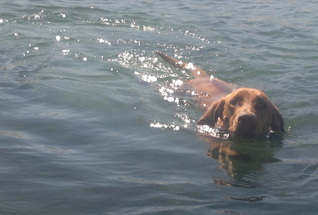Dogs are sentient beings. They feel. They have emotions. If you live with one, you are nodding your head in agreement as you read this. You may have even sighed one day and said, "Fido's having a bad day." I think dogs do have good days and bad days. Days where they feel more active and respond quickly and days where they seem sluggish, or unwell, or simply can't be bothered!
Sometimes I think I know the reason behind a behaviour. I stress the word 'think' because I can't get into a dog's head to know what is turning those cogs. I can guess. However, no matter how much I would love too, I will never really know without a level of uncertainty.
| Oh, sure, I can pick 'happy'. I can pick 'scared'. I can spot 'content right here on the couch' or 'content right here sprawled out in the sun'. Zuri does a heck of a lot of 'content', which I'm quite happy about. Beyond that, I'm making educated guesses with the information I have at hand and the level of observation skills that I have accrued to date. |
Too often when a dog does something we humans don't like, we go straight into solving the problem by stopping the behaviour. There is often little thought spared for why the dog may be doing the undesired behaviour. For example, a dog is escaping the yard every time he is left alone. An electronic containment system a.k.a. electric fence is erected to stop this behaviour. Problem solved. Except, no one asked the dog why he only escaped when he was left alone and not when someone was home. If they had, he might have told them he was suffering from separation distress and literally panicked when he was alone, desperately seeking escape to follow and search for his guardians or simply escaping through sheer anxiety. Now his anxiety levels have every reason to escalate further as not only is he left alone to panic, he gets shocked when he tries to use the only coping mechanism he knows.
Conversely, when a dog doesn't do something we humans want or have asked, we go straight into blaming the dog for deliberately disobeying, being stupid, being hard to train, being bored, being tired, relying too much on treats or being stubborn.
These are just some of the stock standard impressions we make. This is a very limited list. I am certain there are a myriad of reasons dogs do and don't do things. The part that saddens me further is that when we make these assumptions, we then give ourselves permission to treat the dog as if they ARE deliberately disobeying us and need to be pulled into line, usually by exerting some sort of force to get them to comply with our wishes. It could be as seemingly innocuous as pushing the dog's rump into a sit - a dog who unbeknown to us may have sore hips and find it uncomfortable to sit or sit so quickly. Or pulling a dog out of the car when they don't come quickly enough, not realizing the dog is worried about jumping into an environment that he has never visited before or is getting over feeling car sick.
By the way, even if a dog appears to be deliberately disobeying (and I use that term grimacing because I do not feel it represents what is actually occurring) there's STILL a reason.
Consider a common case of recalling a dog from playing in the park with other doggy mates, especially with the lead poised ready in your hand for an end to all the fun. It's simple logic that doggy mates trump confinement back on lead unless, and here's the clincher, you have trained your dog that coming to you is always a good thing and is worth his while. So really, the reason isn't deliberate disobedience, it's the omission of the guardian to thoroughly teach a dog to come regardless of distractions.
That was until I heard the tinkle of a cat bell behind me and Zuri's arch nemesis, Bede, the fearless ambusher of Rhodesian Ridgebacks, sprang from his hiding place behind the fence.Obviously tired of preparing to pounce on Zuri as she came through the door, he could wait no longer. She knew all along that Bede was there. Sorry Zuri.
There's always a reason.
See if you can spot some of the reasons in this short video I compiled in an attempt to show some examples of why dogs may be doing the things they do.





 RSS Feed
RSS Feed